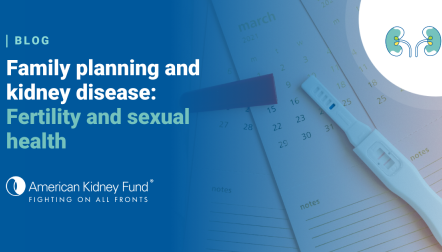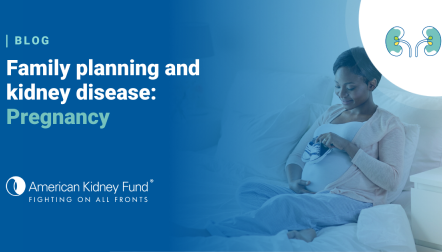
Chronic Kidney Disease (CKD) and Fertility
- Medically reviewed by
- Dr. Jessica Tangren
- Last updated
- September 24, 2024
What is fertility?
Fertility refers to your ability to become pregnant and have children. Women (or people with a uterus and ovaries) are most fertile (most able to become pregnant) in their late teens and twenties, but fertility continues into their forties
Fertility also applies to men (or people with testicles). While men do not carry a pregnancy, the health and amount of their sperm is important for their partner's ability to become pregnant. Sperm are cells created in the testicles and are responsible for fertilizing an egg, resulting in an embryo, which is the earliest stage of growth for a baby.
Men are fertile for most of their lifespan. However, men with chronic health conditions can experience a decline sperm quality which can impact their fertility.
Infertility is defined as the inability to become pregnant after 12 months (one year) of trying. It is a common condition, occurring in 1 in 6 people across the world.
CKD and women's fertility
Your kidneys are responsible for many bodily processes, including some hormones (chemical messengers in your body) that regulate your fertility. It is not fully known how chronic kidney disease (CKD) affects your ability to become pregnant, however scientists know that as your glomerular filtration rate (eGFR) declines, so does your fertility. In other words, as CKD becomes more advanced, your ability to become pregnant decreases.
Once your eGFR is below 15 mL/min, changes in your menstrual cycle (periods) can develop. This can include no longer ovulating (the process by which an egg is released from the ovaries into the uterus). Ovulation is necessary to become pregnant, so when it stops, you are no longer fertile. Your periods may stop entirely, or the time between periods may become longer.
CKD and men's fertility
Men with CKD are also at an increased risk for issues with fertility. Impaired erectile dysfunction, becoming aroused (turned on), creating sperm and having healthy sperm all contribute to these issues.
While this can be caused by hormonal issues, it can also be caused by high blood pressure, diabetes, and certain medicines. High blood pressure and diabetes can damage blood vessels, causing erectile dysfunction. Medicines can lower the amount of sperm, how easily the sperm can move, and the function of the sperm.
Dialysis can also impact the health and amount of sperm.
Transplant and fertility
After a kidney transplant, fertility is often improved for both women and men. This is because the kidney transplant can restore the hormonal cycles. Women can resume a normal menstrual cycle as soon as 6 weeks after a kidney transplant.
Rates of successful pregnancies after transplant are similar to the general population, however it is important to work with your healthcare providers if you want to become pregnant after a transplant. Many medicines used to keep your kidney transplant healthy cannot be used in pregnancy because they may harm the developing baby, so it's important to discuss future pregnancy plans with your doctors.
What can I do if I have CKD and struggle with fertility?
Struggling with fertility is a difficult experience, both physically and mentally.
Talk to your nephrologist (kidney doctor) about your pregnancy goals and if you are experiencing infertility. You can also request to see a fertility specialist, called a reproductive endocrinologist.
If you do not feel supported or listened to by your nephrologist when discussing family planning, you can let them know and ask to see a new nephrologist.




